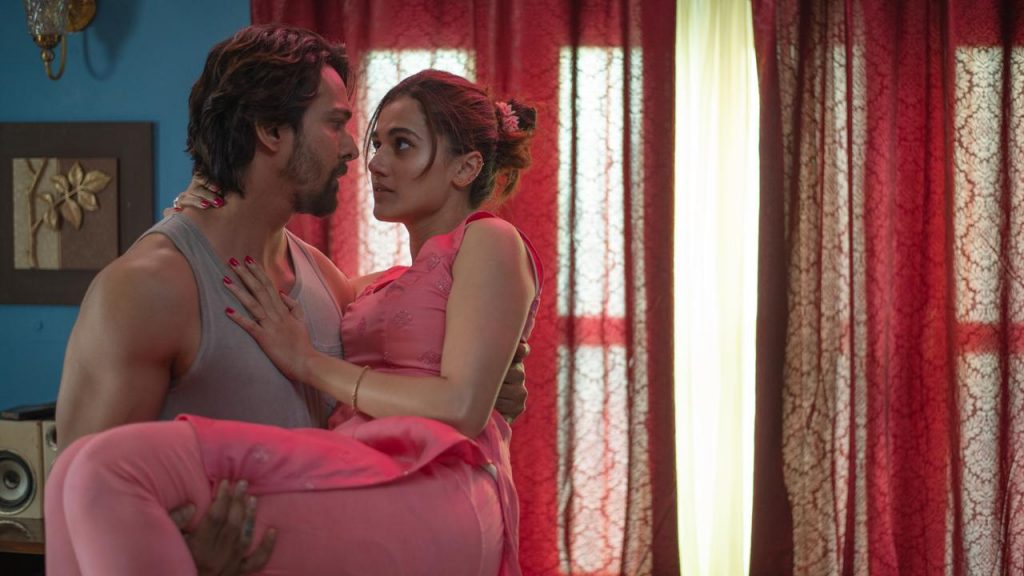Psychological thrillers prod us to examine the darkness in others and within ourselves. As the narrative propels forward, we explore the protagonists’ innermost thoughts and motivations, which push them into the extremes of human ethics and morality. But despite faithfully ticking all the requisite boxes of the genre, Vinil Mathew’s Haseen Dillruba, currently streaming on Netflix, fails to sustain. Nevertheless, we sit through right till the end expecting the big twist and pay-off. But even as it does come about, it fails to rescue the film.
The film is set in the town of Jwalapur and begins with an explosion while Rani Kashyap (Taapsee Pannu) is feeding a stray dog. The blast has caused the death of Rani’s husband, Rishab Saxena alias Rishu, (Vikrant Massey). The investigating officer, Kishore Rawat (Aditya Srivastava), has been informed by the forensics team that it is a case of murder and that the main suspect (Rani) would be put behind bars once the murder weapon linking her to the crime is found. Through a flashback we see that Rishu and Rani had got together via an arranged marriage. But he is much too simple and naive for Rani. He could neither satisfy her emotionally nor physically and moreover, Rani has absolutely no interest in being the typical homemaker as expected by her mother-in-law, Lata (Yamini Das). Almost on cue Rishu’s cousin, the muscular and hunky, Neel (Harshvardhan Rane), enters Rani’s life. Neel provides Rani with all that was missing in her life. But Rani cannot hold the burden of maintaining an illicit relationship for long and reveals all to her husband. What follows next is a tale of jealousy, passion, revenge and sacrifice.
The film and the screenplay has little going for it as the film unsuccessfully attempts to blends the genres of a family drama and a murder mystery. The few powerfully written and executed sequences are so far and few in between that they appear as condiments sprinkled over an undercooked dish rather than the main dish itself. The surprises and twists do not engage and after a while we stop caring about the characters and what happens to them even sa we wait for the big reveal at the end. Any film that deals with the investigation of murder almost always emphasizes the procedure of the investigation to build up ongoing tension between what the audience knows and what the characters know or do not know. However, the interrogation scenes between Rawat and Rani here totally are devoid of any intrigue, many a time falling into a rather monotonous pattern. Even scenes such as Rani intentionally dropping the pallu of her saree to seduce her husband and Lata disapproving of Rani’s enticing act appear much and rather unconvincing. Rishu practicing homeopathy also does not add much to the plot. The recurring motif of the pulp novels by Dinesh Pandit within the scenes becomes too predictable a trope.
The performances, too, are a mixed bag. Taapsee tries hard but is defeated by a character that has been fleshed out on a rather superficial level and one that is devoid of layering. Vikrant Massey comes off comparatively better as he effectively portrays the troubled inner world of a young man’s innocence with the harsh realities of his married life. Harshvardhan Rane seems to be cast only because of his looks and sculpted body and he is unable to bring much depth to his characterization. Aditya Srivastava, who had displayed much restraint and composure as Munna Raja in Raat Akeli Hai, lacks nuance and complexity in his portrayal of Kishore though it is such a key role. Both Yamini Das and Daya Shankar Pandey should have been given more screen time for their characters to come alive.
Cinematographer Jayakrishna Gummadi creates a rich and colourful canvas for the narrative to play out. It’s a pity it flows tepidly though. Shweta Venkat brings all her dexterity and finesse to cohesively shape the material at her disposal but is unable to salvage the film, whose key problems lie in the script itself.At times. the three primary characters appear to be recycled from writer Kanika Dhillon’s earlier Manmarziyaan (2018). Though some of the dialogues are witty, and ‘in-your-face’ with the magic of local flavor, most of them strike one as overwritten. The feeble homage to Roald Dahl is just that – a feeble homage. Amar Mangrulkar’s background score is quite a letdown, failing to lift the film.
Overall, Haseen Dillruba is no doubt stylish and occasionally atmospheric too but is finally let down by its extremely weak writing and its unsatisfactory execution.
Hindi, Drama, Thriller, Color


